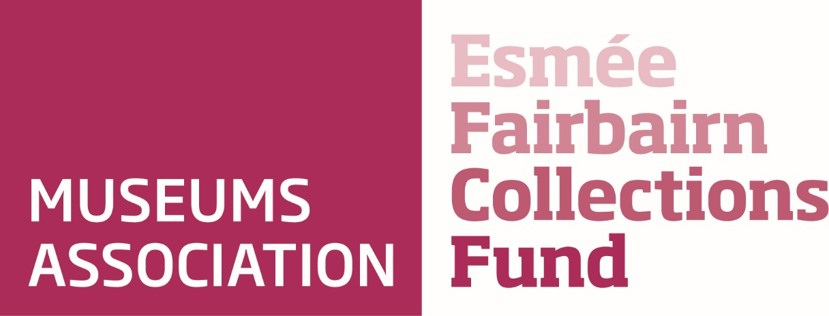
Literary Greats of the 19th Century in the Townshend Collection
This exhibition has been researched and curated by University of East Anglia student Maddy Scott during a post graduate placement.
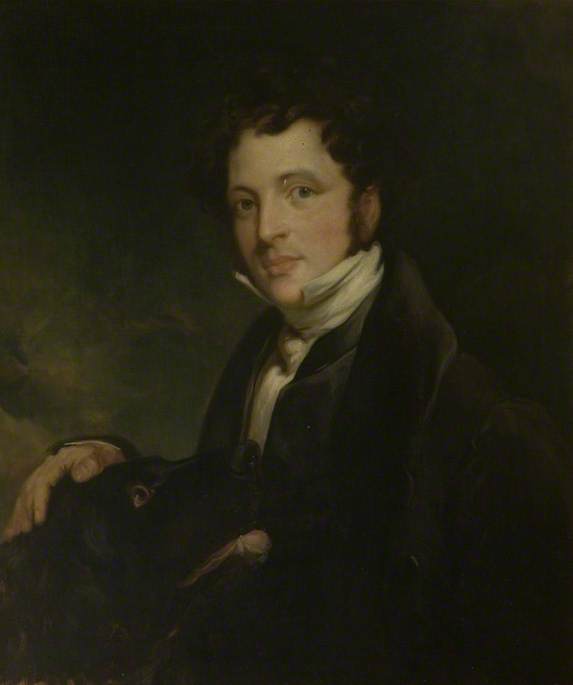
Click on the images in the gallery below to enlarge
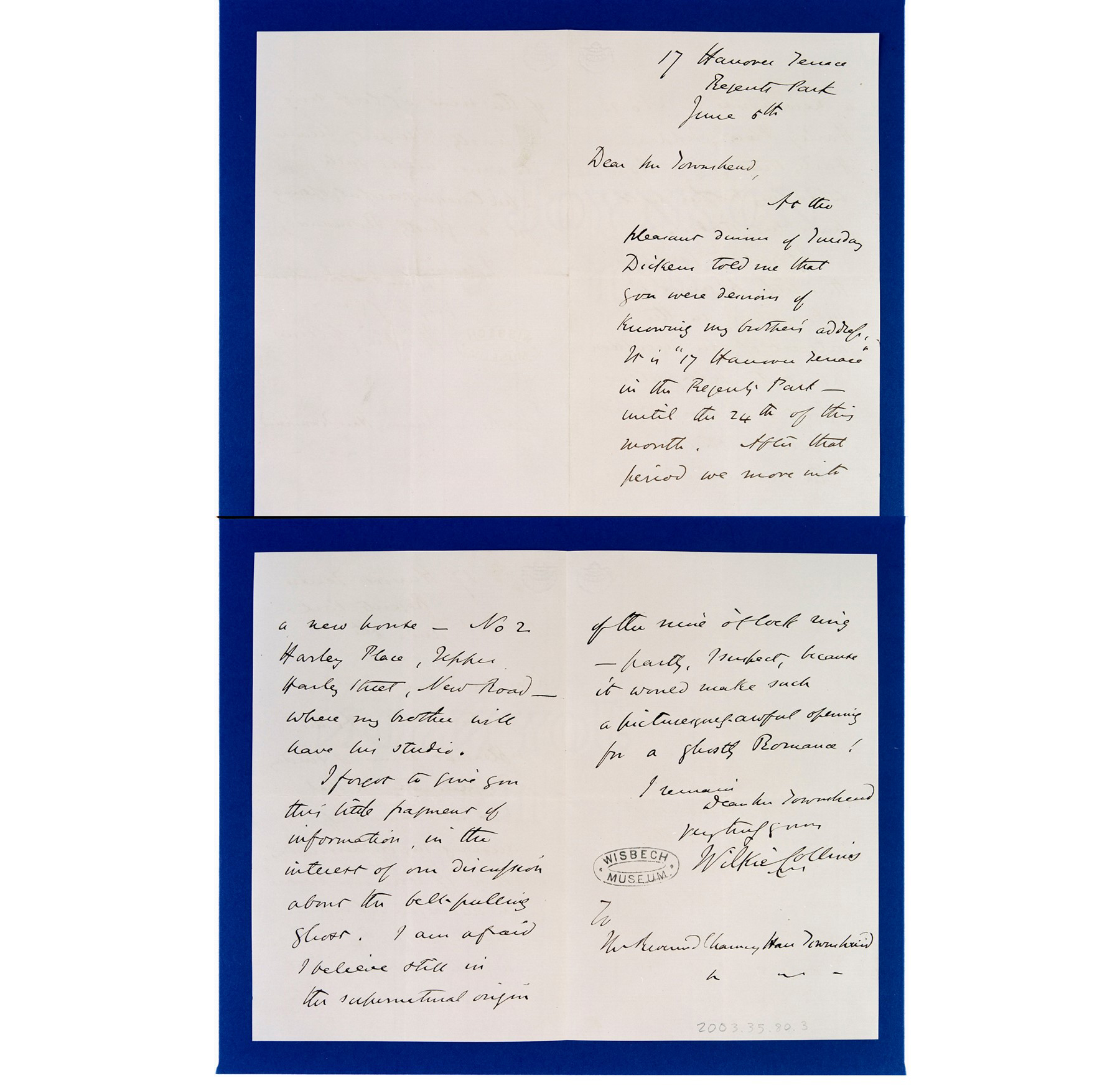
Wilkie Collins to Chauncy Hare Townshend. 5 June 1857
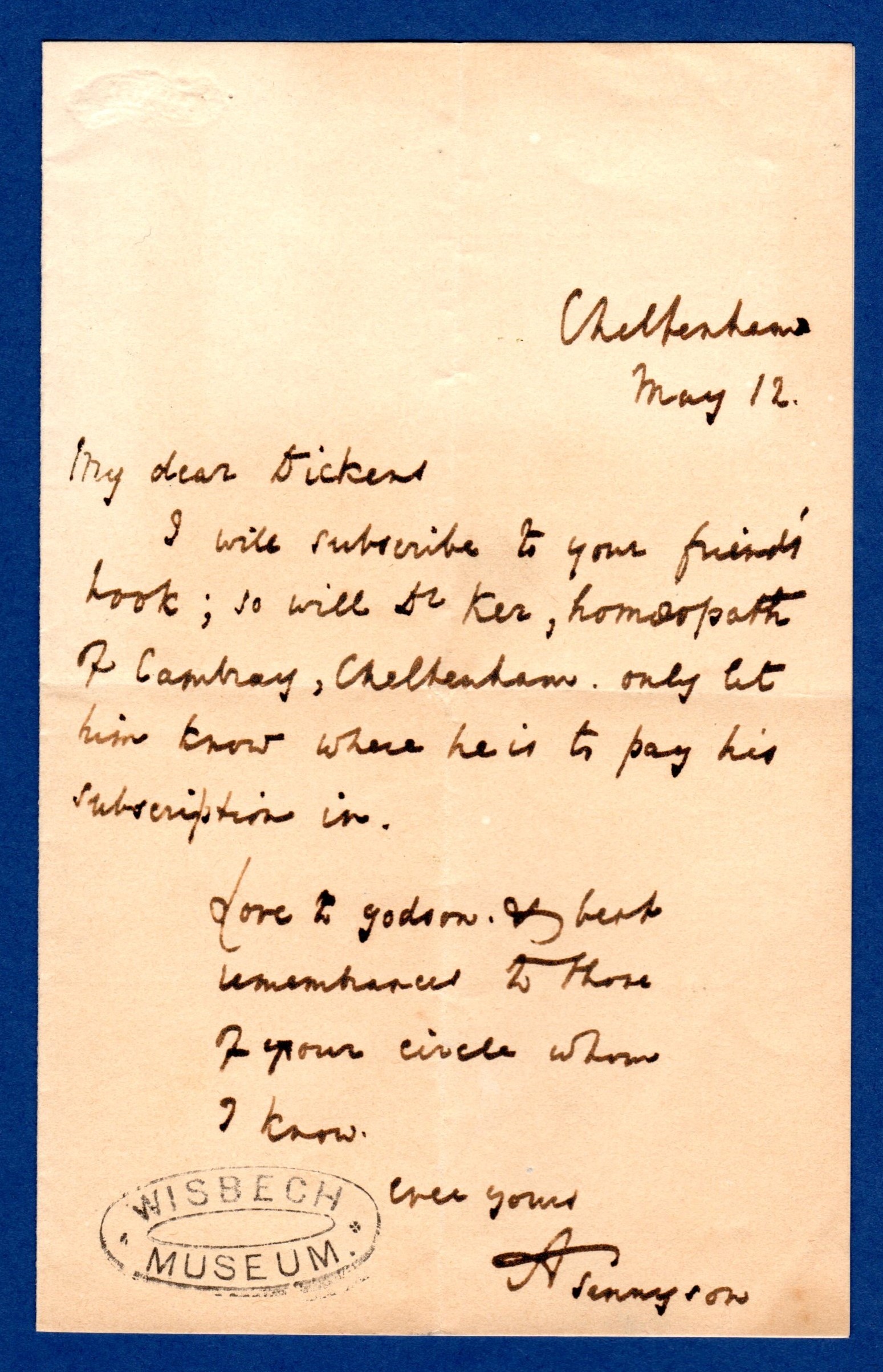
Lord Alfred Tennyson. May 12 18??
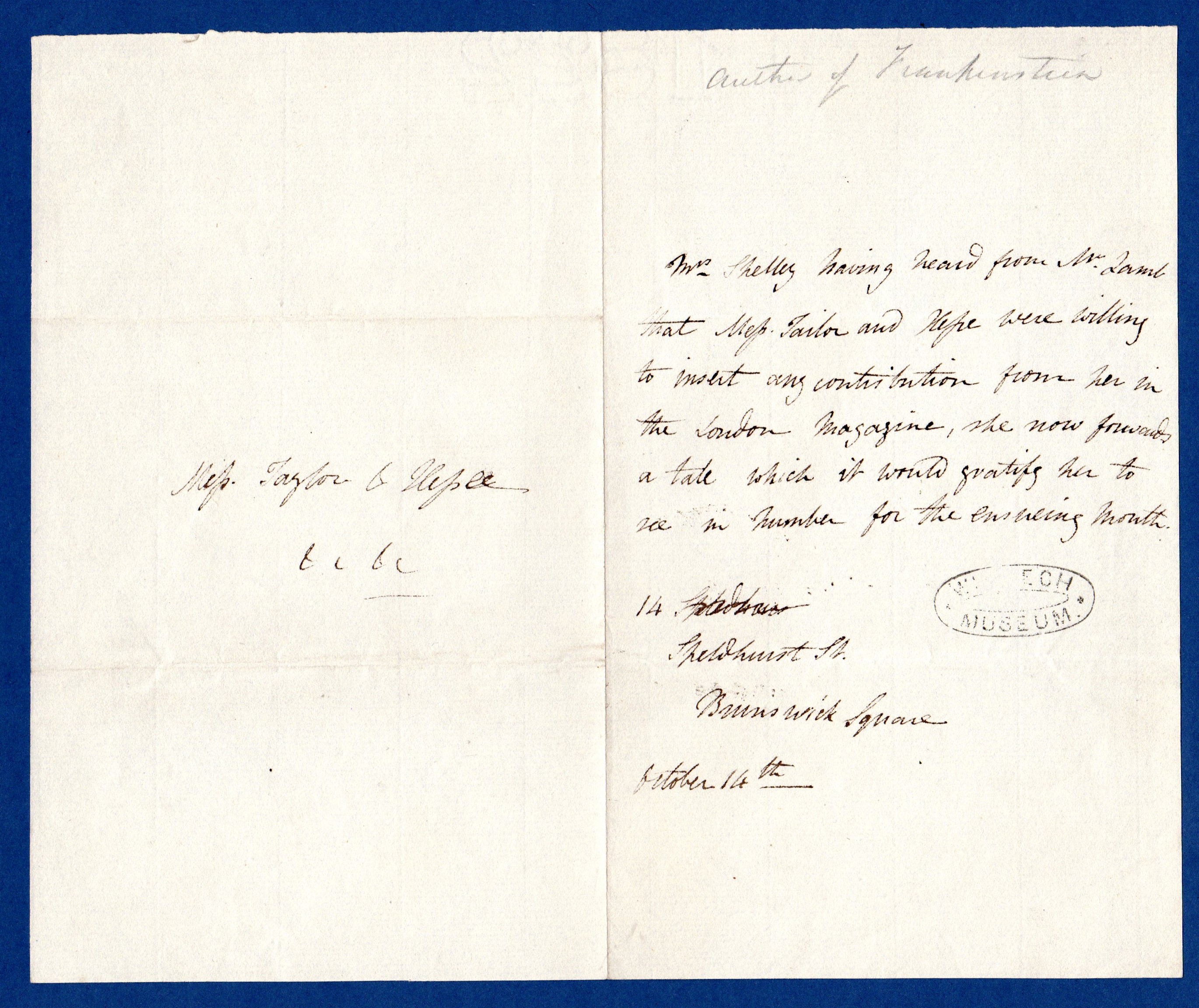
Mary Shelley to Taylor & Hessey (publishers) 14 October 18??
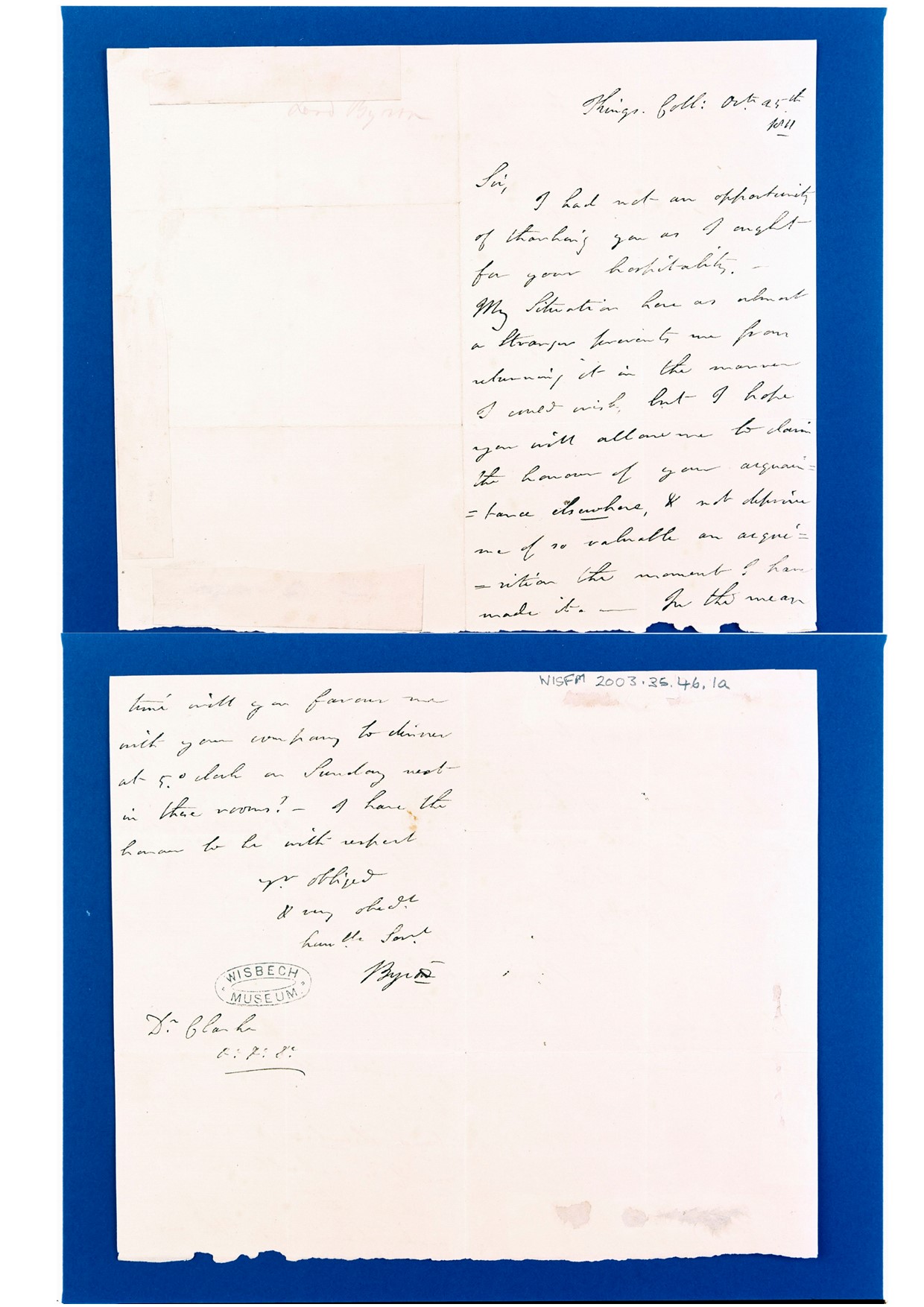
Lord George Gordon Byron to John Murray Esq. 25 October 1811
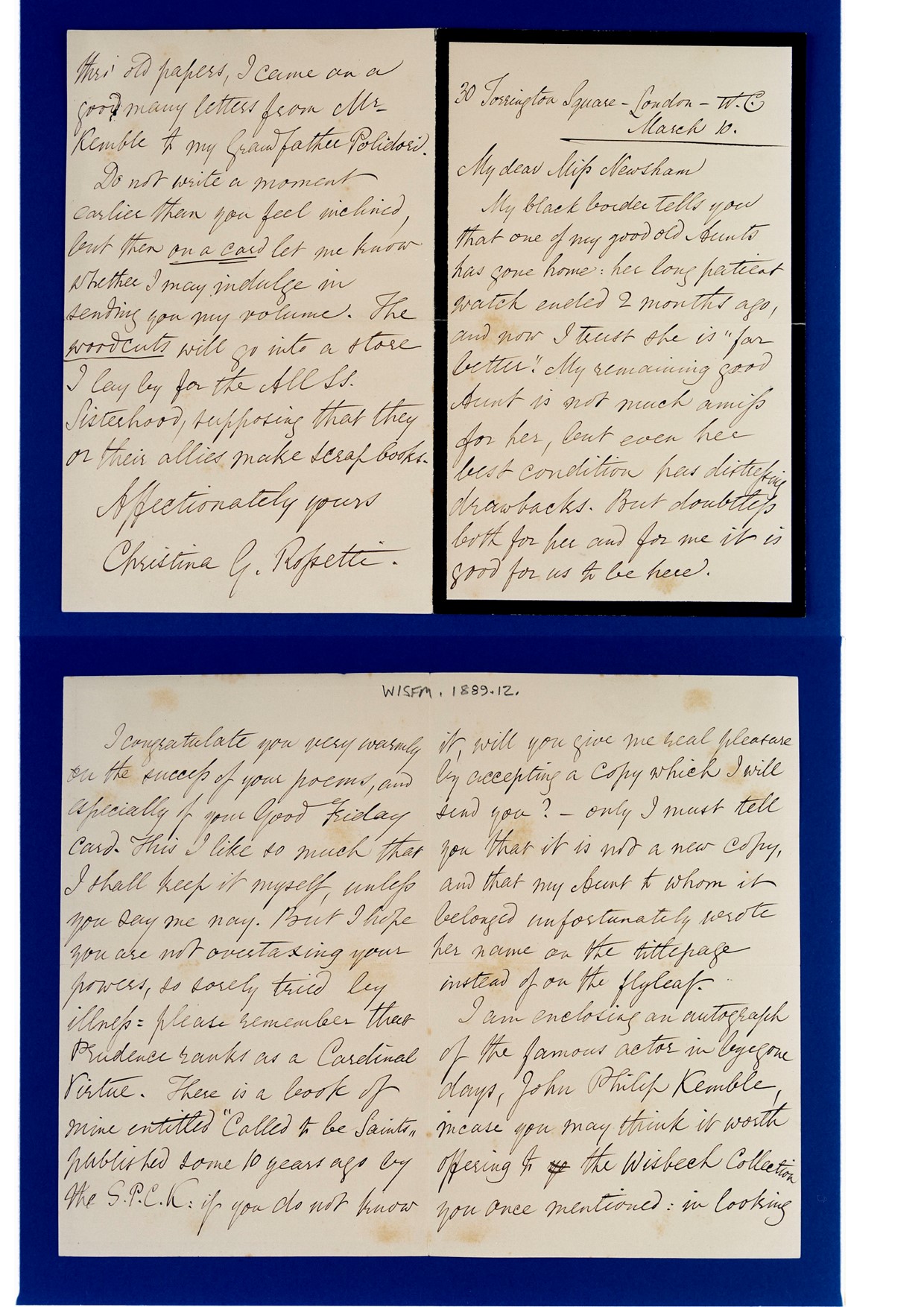
Christina G. Rossetti to Miss L. Newsham
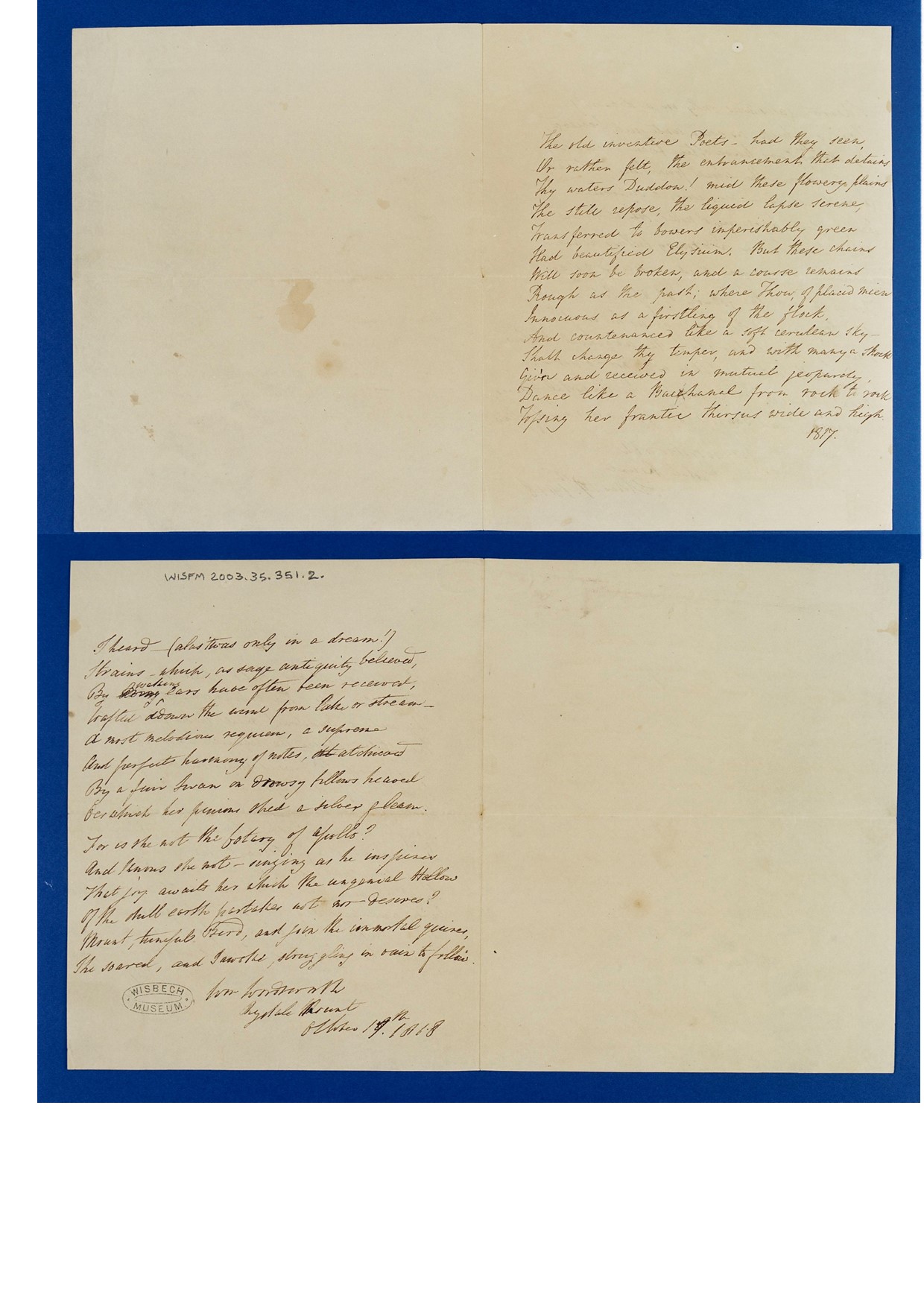
William Wordsworth to Chauncy Hare Townshend

Wilkie Collins to Chauncy Hare Townshend. 5 June 1857
William Wilkie Collins (1824 - 1889) was an English writer, best known for his mystery novels The Woman in White (1859) and The Moonstone (1868). In London, Collins met Charles Dickens who became a lifelong friend, mentor and collaborator; some of Collins’ writing appeared in Dickens’ journals. In 1863, he travelled to the Norfolk Broads and stayed in Winterton-on- Sea, with his wife Caroline to work on a novel. In 1868, aged 44, he met 19 year old Martha Rudd there and began a relationship with her. Critical of the institution of marriage, Collins divided the last 20 years of his life between Caroline and their children, and Martha and their children. Later in life, Collins developed gout, which was treated with opium to which he became addicted. His health and writing quality declined, leading to fading eyesight and his death from a paralytic stroke. This letter to Townshend says that Dickens had told him that Townshend desired his brother’s address which he supplies. It gives him the chance to affirm that he still believes in the supernatural origin of a ghost story.
Dear Mr Townshend,
At the pleasant dinner of Tuesday Dickens told me that you were desirous of knowing my brother’s address.
It is “17 Hanover Terrace” in the Regents Park - until the 24th of this month. After that period we move into a new house - No 2 Harley Place, Upper Harley Street, New Road - where my brother will have his studio.
I forgot to give you this little payment of information, in the interest of our discussion about the bell-pulling ghosts. I am afraid I believe still in the supernatural origin of the nine o’clock ring - partly, I suspect, because it would make such a picturesque-awful opening for a ghostly Romance!
I remain | Dear to Townshend | Ever yours truly | Wilkie Collins [signature]
To | The Reverend Chauncy Hare Townshend

Lord Alfred Tennyson. May 12 18??
Alfred Tennyson, 1st Baron Tennyson (1809 - 1892) was an English poet and Poet Laureate. He is best known for his poems The Charge of the Light Brigade, Idylls of the King and Ulysses, and was a major influence on the pre-Raphaelite movement. He studied at Trinity College, Cambridge where he won the Chancellor’s Gold Medal for his poem, Timbuktu. Many of his phrases have become part of the popular lexicon, such as “Nature, red in tooth and claw” and “’Tis better to have loved and lost / Than never to have loved at all”. This letter, addressed to Charles Dickens, writes that he will subscribe to his friend’s book as will Dr. Ker of Cambray, Cheltenham.
___________________________________________________________________________________________
Cheltenham
May 12
My dear Dickens
I will subscribe to your friends’
book; so will Dr Ker, homeopath
of Cambray, Cheltenham. Only let
him know where he is to pay his
subscription in.
Love 2 Godson. Very best
remembrances to those
of your circle whom
I know.
Ever yours | A Tennyson

Mary Shelley to Taylor & Hessey (publishers) 14 October 18??
Mary Wollstonecraft Shelley (1791 - 1851) was an English author. She is best known for her novel Frankenstein (1818), which has been credited with inventing the science fiction genre. Shelley was also the editor and promoter of the works of her husband, Percy Bysshe Shelley, a Romantic poet, and was the daughter of political philosopher and anarchist William Godwin and philosopher and feminist Mary Wollstonecraft. After the death of her husband in Italy, Shelley returned to England with their son and continued her career as an author. Her later novels include Valperga (1823) and The Last Man (1826) and she also wrote travelogues and biographical articles. She died of a brain tumour, aged 53. This letter to her publishers is written in the 3rd person and unsigned. Requesting her enclosed tale be included in the next number of the “ London Magazine.” Mr. Lamb had encouraged her to submit it.
______________________________________________________________________________________________________
Author of Frankenstein (to annotate with footnote as written in another hand)
Mrs Shelley having heard from Mr Lamb
that Messrs. Tailor and Hope were willing
to insert any contribution from her in
the London Magazine, she now forwards
a tale which it would gratify her to
see in November for the ensuing month.
14, Speldhurst Street
Brunswick Square
October 14th

Lord George Gordon Byron to John Murray Esq. 25 October 1811
George Gordon Byron, 6th Baron Byron, known as Lord Byron (1788-1824) was an English poet and politician, one of the most well-known figures in the Romantic movement and is frequently regarded as one of England’s best poets. His best known work is the epic poem Don Juan, and he was friends with many of the other Romantic poets that appear in this exhibition. Byron frequently travelled across Europe, mostly in Italy and fought in the Greek War of Independence against the Ottoman Empire. Byron’s personal life has been the cause of much speculation and analysis both contemporaneously and today, and has been described as the first modern-day celebrity. This letter describes his thanks to Dr Clarke, his publisher, for his recent hospitality and invites him to dinner in his college rooms. The envelope is addressed by Lord Byron to John Murray Esq. from abroad.
________________________________________________________________________________________________
Kings College: Oct 25th
1811
Sir,
I had not an opportunity
of thanking you as I ought
for your hospitality.
My situation here as almost
a stranger prevents from
returning it in the manner
I could wish, but I hope
you will allow me to claim
the honour of your acquaintance
elsewhere,
& not deprive
me of so valuable an acquisition
the moment I have made it. -
In the mean time will you favour me
with your company to dinner
at 5.o clock on Sunday next
in the rooms? - I have the
honour to be with respect
Your obliged | & very obedient | Humble Lord | Byron
Dr. Clarke
E.S.Q

Christina G. Rossetti to Miss L. Newsham
30 Torrington Square - London - W.C.
March 10
My dear Miss Newsham
My black border tells you
that one of my good old Aunts
has gone home: her long patient
watch ended 2 months ago,
and now I trust she is “far
better”. My remaining good
Aunt is not much amiss
for her, but even her
best condition has distressing
drawbacks. But doubtless
both for her and for me it is
good for us to be here.
I congratulate you very warmly
on the success of your poems, and
especially of your Good Friday
card. This I like so much that
I shall keep it myself, unless
you say me nay. But I hope
you are not overstating your
powers, so sorely tried by
illness: please remember that
Prudence ranks as a Cardinal
Virtue. There is a book of
mine entitled “Called to be Saints”
published some 10 years ago by
the S.P.C.K: if you do not know
it, will you give me real pleasure
by accepting a copy which I will
send you? - only I must tell
you that it is not a new copy,
and that my Aunt to whom it
belonged unfortunately wrote
her name on the titlepage
instead of on the flyleaf.
I am enclosing an autograph
of the famous actor in byegone [sic]
days, John Philip Kemble
in case you may think it worth
offering in the Wisbech collection
you once mentioned: in looking
thro’ old papers, I came on a
good many letters from Mr
Kemble to my Grandfather Polidori.
Do not write a moment
earlier than you feel inclined,
but then on a card let me know
whether I may indulge in
sending you my volume. The
woodcuts will go into a store
I lay by for the All SS
Sisterhood, supposing that they
Or their allies make scrapbooks.
Affectionately yours | Christina G. Rossetti.

William Wordsworth to Chauncy Hare Townshend
The old inventive Poets - had they seen,
Or rather felt, the entrancement that detains
Thy waters Duddon! Mid these flowery plains
The still repose, the liquid lapse serene,
Transferred to bowers imperishably green
Had beautified Elysium. But these chains
Will soon be broken, and a course remains
Rough as the past; where thou, of placid mien
Innocuous as a firstling of the flock,
And countenanced like a soft cerulean sky -
Shalt change thy temper, and with many a shock
Giv’n and received in mutual jeopardy,
Dance like a Bacchanal from rock to rock
Tossing her frantic thyrsus wide and high.
1817
I heard (alas ‘twas only in a dream!)
Strains, which, as sage antiquity believed,
By waking ears have often been received,
Wafted adown the wind from lake or stream -
A most melodious requiem, a supreme
And perfect harmony of notes, atchieved [sic]
By a fair swan on drowsy billows heaved
Oer which her pinions shed a silver gleam.
For is she not this votary of Apollo?
And knows she not - singing as he inspires
That joy awaits her which the ungenial Hollow
Of the dull earth partakes not, nor desires?
Mount, tuneful Bird, and join the immortal quires,
She soared, and I awoke, struggling in vain to follow
W. Wordsworth | Rydal Mount | October 19th 1818
Our thanks to the Esmée Fairbairn Sustaining Engagement with Collections Fund for funding the development of this area of our website and making this exhibition possible through our digital collections strategy project, New Conversations.
